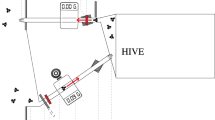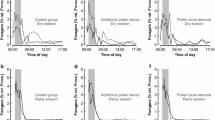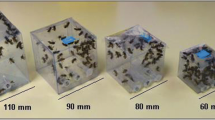Abstract.
We observed the nursing of larvae during all 5 days of larval development. We caged a queen in a specific area of empty combs inside the broodnest and filmed nursing episodes within this area. We created 5-day observation periods with and without artificial rain, as well as periods with and without manual reduction of pollen stores and reduction of pollen income. In rain periods, there were significantly fewer nursing episodes for young larvae (1–3 days old) than in no-rain periods. The nursing frequency was significantly correlated with the amount of pollen in the hive, as well as with the total amount of unsealed larvae. The ratio of available pollen to larvae had the strongest influence on the nursing frequency: the more pollen available per larva, the higher the nursing frequency of young larvae. Higher nursing frequency, as well as a longer total duration of nursing episodes, resulted in a higher protein content of the larvae. In contrast, the frequency of nursing of older larvae (4 days old) did not depend on the amount of pollen or on the ratio of pollen to larvae, even after some days of severe pollen reduction. The amount of honey stores and the weight of the hive were not correlated with the nursing frequency of any larval age group. When pollen becomes scarce, older larvae receive preferential treatment. They represent a considerable investment for the colony. From an economic point of view, it is important for the colony that they reach the "safe" final capping stage.
Similar content being viewed by others
Author information
Authors and Affiliations
Additional information
Electronic Publication
Rights and permissions
About this article
Cite this article
Schmickl, .T., Crailsheim, .K. How honeybees (Apis mellifera L.) change their broodcare behaviour in response to non-foraging conditions and poor pollen conditions. Behav Ecol Sociobiol 51, 415–425 (2002). https://doi.org/10.1007/s00265-002-0457-3
Received:
Revised:
Accepted:
Issue Date:
DOI: https://doi.org/10.1007/s00265-002-0457-3




